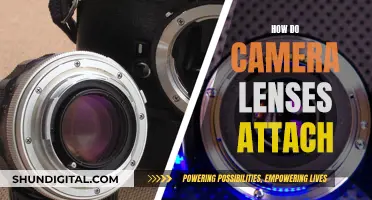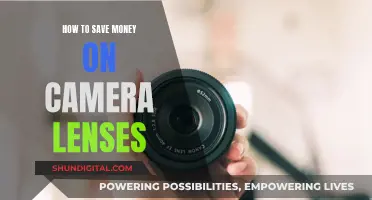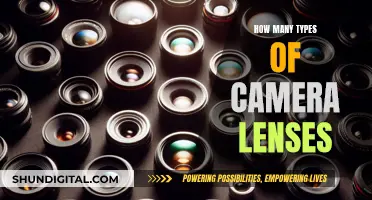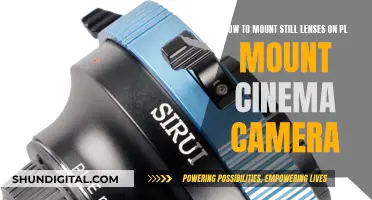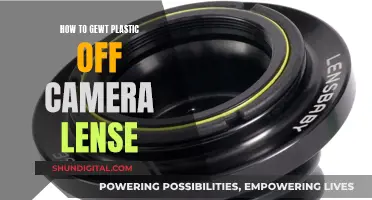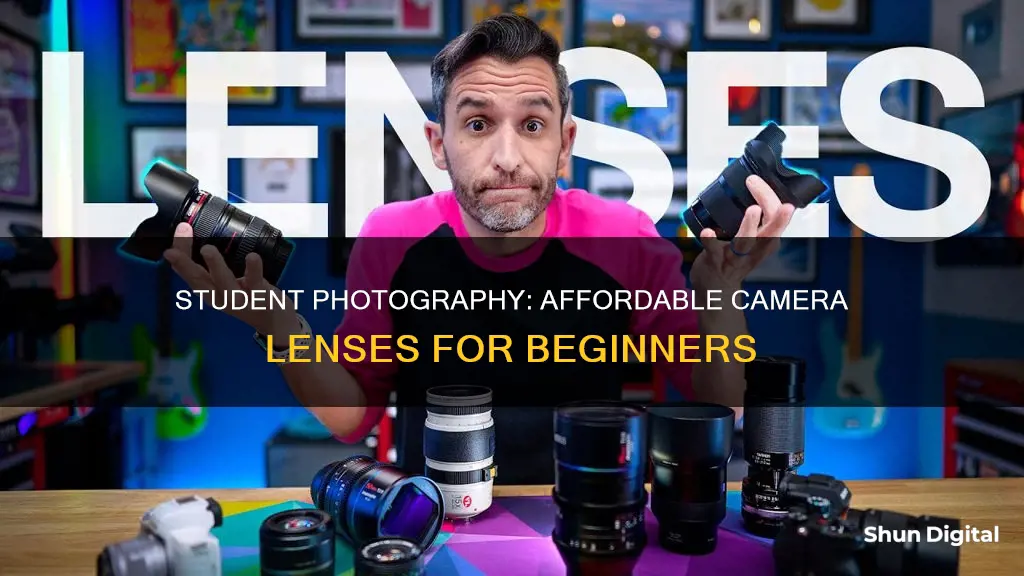
As a student, you may be wondering how you can afford camera lenses, especially if you are an amateur photographer. There are several ways to go about this. Firstly, consider buying used lenses from websites like Craigslist or pawn shops, as they are usually much cheaper than buying new ones. You could also look for deals on open-box or scratched lenses, which are often heavily discounted. Additionally, buying vintage lenses and converters or opting for lenses from other brands like Sigma, Tamron, or Samyang can be more affordable options. If you already have some photography gear, you can sell your old equipment to finance new purchases. Another option is to allocate a monthly budget or use zero-interest credit cards to pay for your desired lenses. Alternatively, you could try your hand at side gigs or focus on selling your photos to earn money for new lenses. Lastly, if you're just starting, consider investing in a cheaper camera body and a more expensive lens to enhance your creativity and excitement.
What You'll Learn

Buy second-hand lenses
If you're a student looking to buy camera lenses, one of the best options is to buy second-hand. This can be a great way to get high-quality lenses at a fraction of the cost of buying new. Here are some tips for buying used lenses:
Know the Market
Before buying a second-hand lens, it's important to do your research and know the market. This means knowing the average price that a particular lens is selling for. That way, you can spot a good deal when you see one. Keep an eye on prices for the lens you want across different websites and platforms.
Buy from Reputable Sellers
When buying used lenses, it's important to buy from reputable sellers. Look for sellers who specialise in used camera gear, such as KEH, or buy from well-known online marketplaces that offer buyer protection. This will give you peace of mind and ensure that you're getting a genuine product.
Check the Condition
When buying second-hand, always check the condition of the lens carefully. Look for any signs of damage or wear and tear. It's also a good idea to test the lens before buying, if possible. Check that the focus and zoom rings are working smoothly and inspect the lens for any dust or scratches.
Consider Older Models
Older models of lenses can be a great option for students on a budget. Lens technology doesn't improve as quickly as camera body technology, so you can often find older lenses that are still in great condition and will produce high-quality images. Just make sure that the lens is compatible with your camera body.
Shop Around
Don't be afraid to shop around and compare prices from different sellers. You may find the same lens listed at very different prices, so it's worth taking the time to find the best deal. You can also consider buying lens packages and then reselling any items you don't need individually, as this can sometimes be a way to get a great deal on the lens you want.
Sell Your Old Gear
If you already have some camera gear, consider selling your old lenses or camera body to help finance your new purchase. This can be a great way to offset the cost of your new lens and ensure that your old gear goes to a new home where it will be used and appreciated.
By following these tips, students can find great deals on second-hand lenses and build up their photography kit without breaking the bank.
Camera Lenses: Waterproof or Not?
You may want to see also

Save up for a few months
Saving up for a few months is a great way to afford camera lenses as a student. Here are some tips to help you save effectively:
Set a Clear Goal
Start by setting a clear and realistic savings goal. Research the cost of the camera lens you want, including any additional expenses such as taxes or shipping. Knowing the exact amount you need will help you stay motivated and create a clear plan.
Create a Budget Plan
Examine your income and expenses to create a budget that allows for savings. Allocate a fixed amount from your income, such as a monthly allowance or earnings from a part-time job, specifically for your savings. Cut down on non-essential expenses, like eating out or subscription services you may not need. Consider using budgeting apps or spreadsheets to track your spending and ensure you stick to your savings plan.
Explore Additional Income Streams
Look for opportunities to increase your income. You could take on freelance work, part-time jobs, or sell unwanted items online. For example, you could sell your old camera gear or other pre-loved items to boost your savings.
Practice Patience and Self-Control
Saving for a few months requires discipline and patience. Avoid impulse purchases and unnecessary expenses. When you feel tempted to spend, remind yourself of your savings goal and the benefits of waiting. For example, by saving for a few months, you may be able to afford a higher-quality lens or have money left over for other photography equipment.
Automate Your Savings
Consider setting up an automatic transfer from your income source to your savings account. Automating your savings can help you save effortlessly and consistently. Many banks allow you to set up regular transfers, so you don't even have to think about it each month.
Stay Motivated
Saving for a few months can be challenging, so it's essential to stay motivated. Visualize how the new lens will enhance your photography and the experiences you'll gain. You could also join online communities or follow photographers who share their experiences and tips for using similar lenses. Their stories and advice can inspire and motivate you to stay on track with your savings journey.
Saving up for a few months as a student demonstrates dedication and financial discipline. By following these tips, you'll be well on your way to achieving your goal of purchasing the camera lens you desire. Happy saving and best of luck with your photography journey!
How Camera Lenses Use Refraction to Capture Images
You may want to see also

Take on side projects
Taking on side projects is a great way to fund your photography gear as a student. Here are some tips to get you started:
Find the Right Side Projects
Side projects are typically personal endeavours that you work on outside of your studies or day job. They are distinct from side hustles, as the primary goal of a side project is not to make money, but rather to explore your interests and satisfy your curiosity. That being said, side projects can still be a source of income, especially if they utilise your skills and knowledge.
For example, you could offer your photography services for events like weddings, birthdays, or graduations. You could also sell your photographs online or create a photography blog or YouTube channel. If you have coding or web development skills, you could design and sell websites or applications.
Plan and Manage Your Time
To ensure you actually complete your side projects, it's important to plan and manage your time effectively. Break your projects down into smaller, achievable milestones and set aside dedicated time blocks to work on them. Be realistic about how much time you can commit, especially if you have a busy schedule with classes, assignments, and exams.
Collaborate with Others
Don't be afraid to collaborate with others on your side projects. Collaboration can provide you with complementary skills and fresh ideas, as well as give you practice working as part of a team – a valuable skill for any job. Look for potential collaborators on campus, whether it's through posting ads on bulletin boards, using campus social media groups, or simply striking up conversations with classmates.
Keep Track of Your Finances
Just as it's important to manage your time, it's also crucial to manage your finances effectively. Keep a detailed log of your equipment transactions, including purchase prices and sell prices. This will help you stay on top of your spending and identify areas where you can save or make money.
Buy and Sell Used Equipment
Consider buying used camera gear from sites like Craigslist or pawn shops. You can often find great deals and, if you take good care of the equipment, you may be able to sell it later for a similar price. Just be sure to do your research and know the average price that specific pieces of equipment are selling for.
By taking on side projects and managing your finances wisely, you'll be well on your way to affording that new camera lens you've been eyeing!
Asurion: Cracked Camera Lens Coverage and Claims
You may want to see also

Buy a cheaper camera body
As a student, you might be working with a tight budget and looking for ways to save money on camera gear. One way to do this is to opt for a cheaper camera body. Here are some tips and suggestions to consider when buying a cheaper camera body:
- Buy used camera bodies: One way to save money is to purchase a used camera body. You can often find great deals on second-hand cameras that are still in good condition. Websites like Craigslist, eBay, and specialist photography retailers like Adorama offer a wide range of used camera bodies from different brands. Adorama, for example, provides a 90-day warranty on their used cameras and allows returns within 30 days.
- Compare prices: When shopping for a camera body, be sure to compare prices from different sellers. You might find the same model being offered at different price points, so it's worth doing some research to ensure you get the best deal.
- Older models: Consider buying camera bodies that are a few generations old. These models will have already depreciated in value, even if they are still in good working condition. This way, you can get a quality camera body without breaking the bank.
- Camera body bundles: Keep an eye out for camera body bundles or packages that include additional items you might need, such as lenses, camera straps, lens caps, or transfer cables. While you might not need everything in the bundle, you can always resell the individual items you don't want to make back some of the money you spent.
- Avoid beginner bundles: While it might be tempting to opt for beginner camera bundles marketed towards students, these are often not a good deal. Instead of buying a cheap camera body with limited features, invest in something more sophisticated that will help you grow as a photographer and last longer.
- Keep track of your spending: Create a detailed log of your camera equipment transactions to help you keep track of how much you're spending. This will also help you identify areas where you can save money or make more economical choices.
- Consider the depreciation: Camera bodies, like cars and computers, depreciate quickly in value. The moment you take the first photo on a new camera, its value instantly drops. Be mindful of this when considering whether to buy a new or used camera body.
Black Friday Camera Lens Deals: What to Expect
You may want to see also

Buy vintage lenses
Vintage lenses are a great option for students looking to get into photography without breaking the bank. They are often far less expensive than their modern counterparts, yet can still deliver fantastic quality.
Where to buy vintage lenses
There are several online marketplaces where you can find vintage lenses, including eBay, Etsy, Facebook Marketplace, and specialist camera stores such as KEH and UsedPhotoPro. You can also check out local options like second-hand shops, charity shops, and estate sales.
Tips for buying vintage lenses
- Do your research: Know the street value of the lens you want. This means finding out the average price that particular lens is being sold for, so you know a good deal when you see one.
- Buy in bulk: Sometimes, you can get a great deal on a package of multiple lenses, even if you only want one of them. You can then sell the other lenses individually to make your money back, or even turn a profit.
- Sell individually: When selling your own vintage lenses, always sell them individually rather than in a package to get the best price.
- Jump on good deals: Even if you don't plan on keeping a particular lens, buying it at a great price means you can try it out and then sell it on for a profit.
- Be cautious: There are risks involved in buying used gear, so be sure to do your research and only buy from reputable sellers.
Example vintage lenses for sale
- Vintage Nikon Nikkor-P Auto 1/2.5 105mm Camera Lens
- Antique Brass Portrait Format Lens Voigtlander & Sohn Wien Braunschweig No. 25024
- Vintage Wollensak 15 Inch f/5.6 Telephoto Camera Lens Large Format with Original Box
- Vintage Canon W. Angle Tilt & Shift TS-E 24mm Lens, f3.5L with Box, Filter and Caps
The Magic of Camera Lenses: How They Attach
You may want to see also
Frequently asked questions
Buy used lenses instead of new ones. You can often find great deals on second-hand lenses online or at pawn shops.
Yes, you can adapt older manual film lenses to newer digital bodies. This can give your images a unique, pleasing character without breaking the bank.
Do your research and know the street value of the lens. Keep track of how much similar lenses are being sold for so you can spot a bargain.
A student camera should be comparatively economical to acquire and operate, have easily adjustable aperture and shutter speed settings, a manually adjustable focus, and interchangeable lenses.
A basic kit lens or a 50mm prime lens is a great starting point for beginners. They are affordable and will help you learn photography techniques without breaking the bank.


